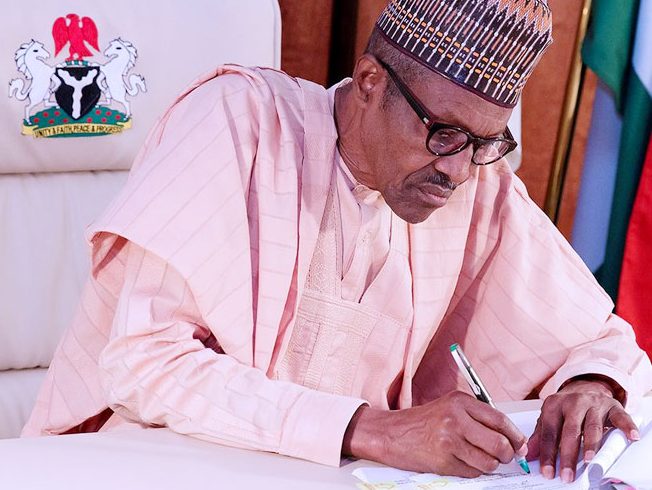President Muhammadu Buhari has signed the N10.8 trillion revised 2020 budget into law.
Mr Buhari signed the document at the Council Chamber of the Presidential Villa, Abuja at 11.06 am on Friday in the presence of Vice-President Yemi Osinbajo; Secretary to the Government of the Federation, Boss Mustapha; Chief of Staff to the President, Ibrahim Gambari.
Others are the Senate President, Ahmed Lawan and Speaker of the House of Representatives, Femi Gbajabiamila and other principal officers also witnessed the signing.
Speaking after the signing, Mr Buhari explained that the budget had to be revised because of the effect of coronavirus on the nation’s economy.
According to him, ministries, department and agencies will be given 15 per cent of their capital allocation by the end of the month.
The President said the 2020 revised budget underscores his Administration’s firm commitment to effectively contain the spread of COVID-19 and protect the lives and livelihood of Nigerians.
Mr Buhari, while recalling that he signed the 2020 Appropriation Act into law in December 2019, said it became necessary to revise the 2020 Appropriation Act in response to recent developments, particularly the COVID-19 pandemic.
According to him, the amendments provide for aggregate expenditures of N10.81 trillion, which is an increase of N216 billion over the level of expenditure initially proposed in the 2020 Appropriation Act, as well as the recently launched N2.3 trillion Stimulus Programme, well-positioned to safeguard the economy.
He noted that Nigeria’s crude oil production quota had been reduced as part of efforts of the Organization of Petroleum Exporting Countries, OPEC, to strengthen the oil market.
“Crude oil prices in the world market had declined from $72.20 per barrel in January to below $20 per barrel in April, and have since remained around $40 per barrel.
“Global trade has generally been disrupted as almost all economies were locked down for protracted periods in the wake of the COVID-19 Pandemic.
“All these developments are plunging the global economy into recession, and Nigeria has not escaped the impact of this. In effect, the assumptions underlying the 2020 Appropriation Act are no longer sustainable,” the President stated.
He, therefore, said it was imperative to adjust our expected revenues, considering the widespread disruptions in domestic and international economic activities due to the COVID-19 Pandemic.
We needed to reallocate resources in the Appropriation (Repeal and Amendment) Act, 2020 to ensure effective implementation of required health and emergency measures, as well as to mitigate the negative socio-economic effects of the COVID-19 Pandemic.
While assuring that 50% of amended capital budgets would be disbursed this month (July), Mr Buhari noted that the sum of N253.33 billion had been released for the implementation of some capital projects as at May 31.
The President acknowledged the efforts of all offices which partnered to produce the amended budget.
Recall that the Federal Executive Council, FEC, had on May 13, approved a revised budget of 10.523 trillion.
However, the National Assembly increased the budget from the initial N10.5 trillion submitted by the President to N10.8 trillion.
The figure shows that the sum of N2,488,789,433,344 is for capital expenditure, while N4,942,269,241,984 is for recurrent non-debt expenditure.
Others are N2.6 trillion for debt service and N2.9 trillion for sinking funds.






